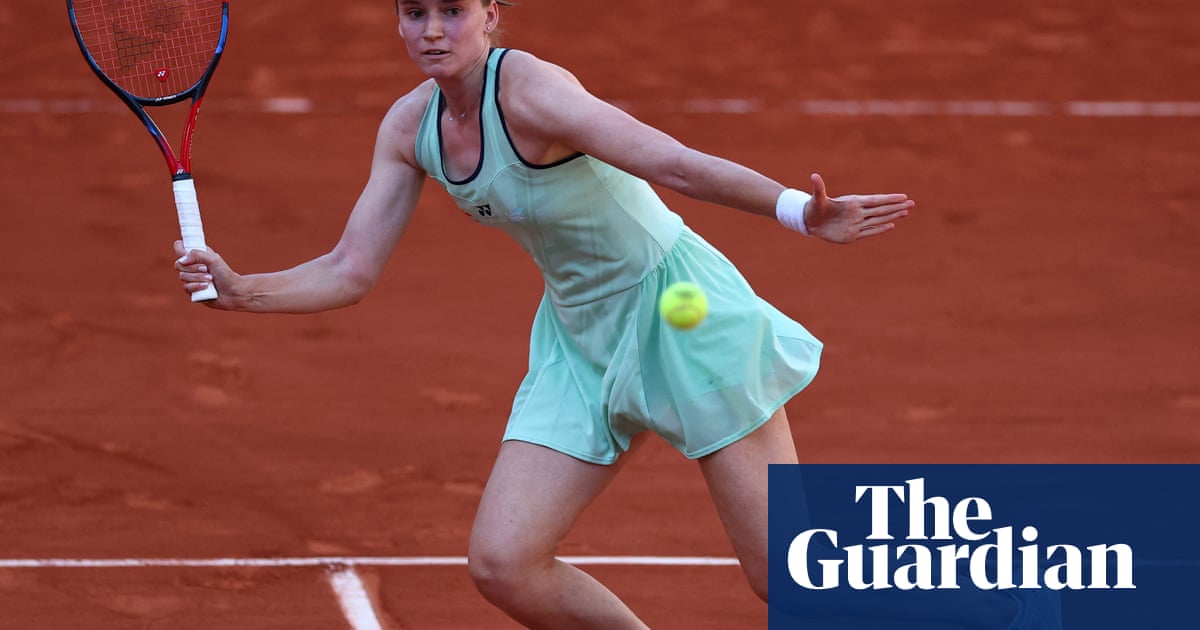Jelena Ostapenko has long been one of the most devastating shot-makers of her generation and every time she steps on to a court, she is there to decide her own destiny in victory or defeat. On Friday afternoon, however, Ostapenko experienced the rare sensation of not being in control as Elena Rybakina put on a devastating exhibition of her effortless, destructive ball-striking to reach the fourth round of theFrench Openwith a 6-2, 6-2 demolition of the former champion.
The most notable consequence of Rybakina’s victory, of course, is that she will renew her rivalry with the four-time champion Iga Swiatek in what will be the most highly anticipated match in either singles draw. In the earlier match on Court Suzanne Lenglen, Swiatek closed out her 24th consecutive victory at the French Open by defeating Jaqueline Cristian 6-2, 7-5.
A week after winning her first title in more than a year in Strasbourg, this victory marks another positive step forward for Rybakina. Much of her past 12 months have been extremely difficult, with the Kazakh falling from her career high ranking of No 3 to her current spot at No 11. Not long ago, Rybakina had positioned herself as the top contender to Swiatek and Aryna Sabalenka. In recent months, she has been her own biggest rival.
Although Rybakina has been frequently sidelined with various illnesses over the past year, her issues have also been personal. In February, her previous longtime coach, Stefano Vukov, was suspended by the WTA tour for a year after the organisation concluded that Vukov had been verbally abusive to Rybakina, breaching the its code of conduct. Despite Rybakina objecting to the suspension, Vukov is banned from attaining accreditation at official WTA events and grand slam tournaments. On Wednesday, Rybakina noted that she continues to work with Vukov on court between tournaments. “We usually practise together between the tournaments, not when the tournament is on,” she said.
It has been eight years since Ostapenko shocked the tennis world by spectacularly winning the 2017 French Open, while Rybakina won her first grand slam title at Wimbledon in 2021. A battle between two major champions is always a significant event, but the prospect of a meeting with Swiatek, and their respective records against the four-time French Open champion, only added a level of significance to the tie.
At this point, the match-up between Ostapenko and Swiatek is the most notorious non-rivalry on the tour. After defeating Swiatek en route to winning the Stuttgart Open title last month, Ostapenko is now 6-0 versus the Pole, having defeated her on every surface. Ostapenko is a supreme ball-striker and, when she finds her rhythm, she times the ball more sweetly than almost any other player. Even so, a player as distinguished as Swiatek having such a difficult match-up against a lesser opponent is shocking.
Although Swiatek avoided her greatest nemesis, facing Rybakina is hardly a positive outcome. Their head-to-head record is tied at 4-4 and Rybakina’s game matches up well against the Pole, with her powerful first serve neutralising Swiatek’s return and she takes time away with her clean, flat ball-striking. As Swiatek attempts to rebuild her confidence on her favourite court after a difficult few months, this will be an enormous test in her push for a fourth consecutive French Open title.
Elsewhere, the top seed Aryna Sabalenka eased into the second week with a comfortable 6-2, 6-3 win over Olga Danilovic of Serbia. Afterwards, Sabalenka said that she is happy for Swiatek to carry the title of favourite, and the pressure that comes with it, in this tournament. “It’s tough to predict in women’s tennis,” she said. “Let’s just leave it on Iga since she won it, what, three times in a row, really, right? I will just leave it for her.”
Elsewhere, Amelie Mauresmo, the French Open tournament director, defended the decision not to schedule women’s matches during the night sessions. “For me, the message that I always said, and I will repeat, the conditions did not change from having one unique match in the evening,” said Mauresmo. “For me, the message is not changing, and it has never been that the girls are not worthy to play at night. It’s never been this. I will not accept that you carry this message. That’s really clear to me.”
